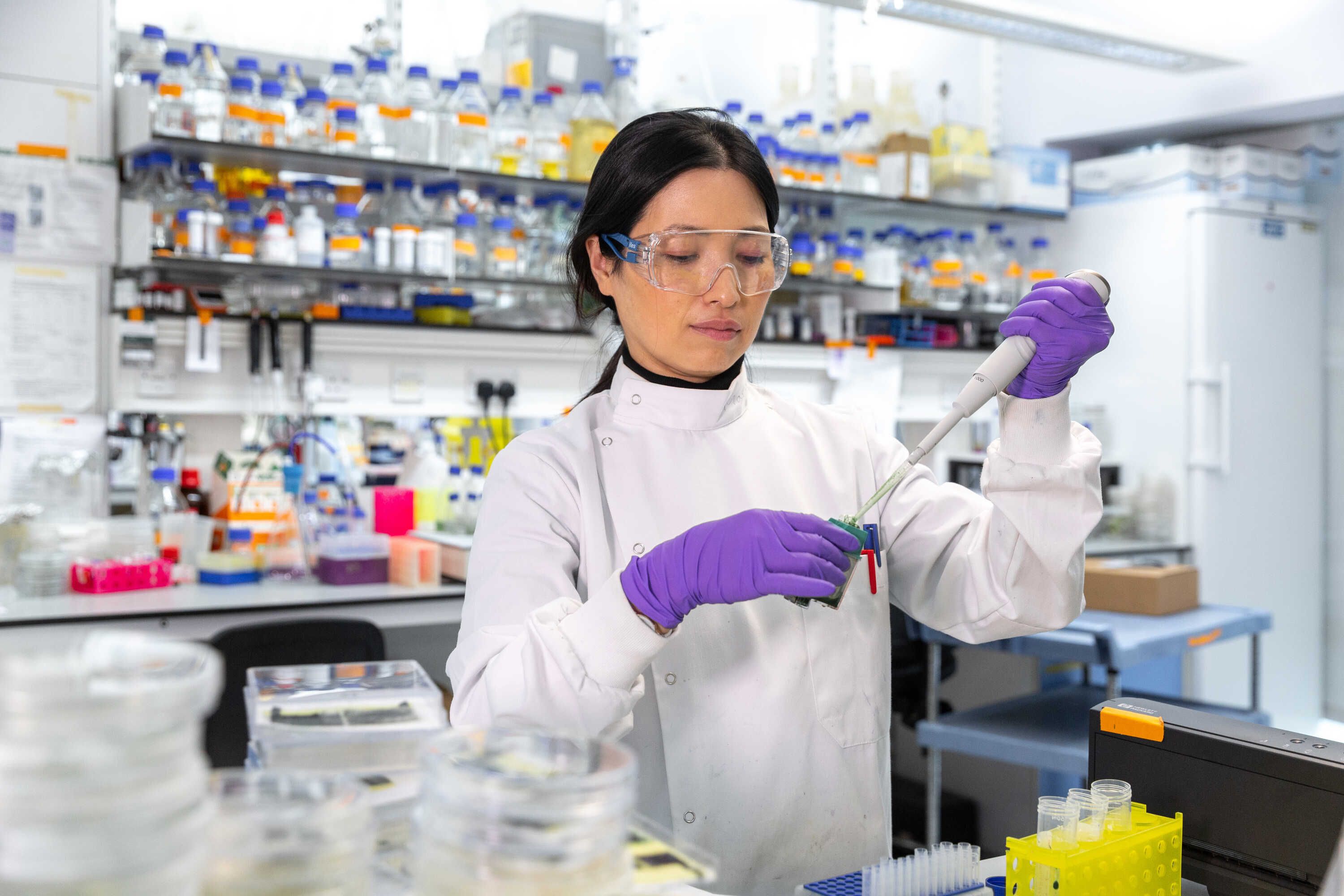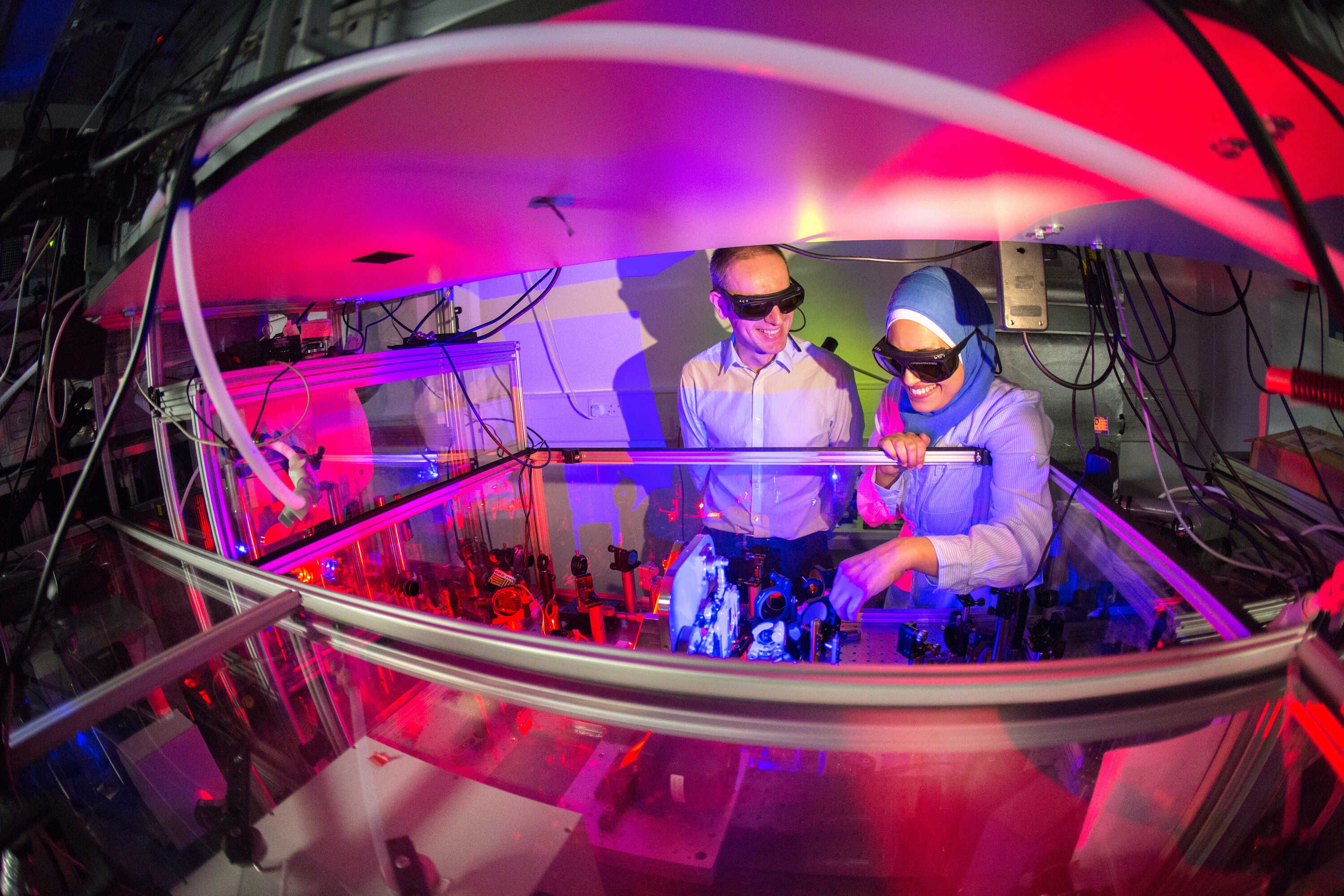
Applied Biosciences and Biotechnology
Gain an in-depth understanding of modern bioscience research and acquire the skills needed to pursue a career in the field.
Gain an in-depth understanding of modern bioscience research and acquire the skills needed to pursue a career in the field
Develop expertise in innovation, entrepreneurship and creative problem-solving
Plan, conduct and evaluate a programme of original research
Course key facts
-
Qualification
-
MSc
-
-
Duration
1 year
-
Start date
September 2025
-
Study mode
Full-time
-
Fees
£15,800 Home
£38,600 Overseas
-
Delivered by
-
Location
-
South Kensington
-
Minimum entry standard
-
2:1 in biochemistry, biology or an appropriate subject
Course overview
Understand the core principles underlying modern bioscience research and be trained in laboratory and research skills on this Master's course.
Diversify your expertise on a programme that explores aspects of biochemistry, molecular cell biology, bioinformatics, and entrepreneurship.
This course equips you with the knowledge and practical skills to plan, conduct and evaluate a programme of original research.
You'll also produce a tutored dissertation and a laboratory-based research project consistent with your interests and career aspirations.
Structure
This page is updated regularly to reflect the latest version of the curriculum. However, this information is subject to change.
Find out more about potential course changes.
Please note: it may not always be possible to take specific combinations of modules due to timetabling conflicts. For confirmation, please check with the relevant department.
You'll complete the following core modules.
Core modules
Build your understanding of biochemistry, molecular cell biology, bioinformatics, systems biology and statistics.
You'll become familiar with fundamental concepts of modern biology, including antibiotic resistance, data driven biology, proteomics, experimental techniques and data handling. You will analyse advanced concepts in applied bioscience.
Further your knowledge of key biotechnology concepts.
This will encompass areas including industrial biotechnology and integrative systems biology.
You'll also explore aspects of innovation and entrepreneurship and attend weekly seminars from invited external speakers.
You’ll also apply the knowledge acquired from the course to a dissertation and research project.
Carry out a full-time dissertation followed by a mini-conference over the Spring term.
Undertake a 16-week full-time project in the laboratories of the Department of Life Science under the supervision of our academic staff. Some projects are organized in small teams, following a biotech-style environment. All projects address timely questions and are renewed annually.
Teaching and assessment
Teaching and learning methods
-
Lectures
-
Case studies
-
Computing labs
-
Practical classes
-
Presentations and seminars
-
Group work
-
Virtual learning environment
-
Lecture recordings
-
Projects and assignments
-
Tutorials
-
Workshops
-
Independent study
Balance of assessment
Key
- Dissertation and research project
- Examinations, coursework and practicals
- 60% Dissertation and research project
- 40% Examinations, coursework and practicals
Assessment methods
-
Coursework
-
Written exams
-
Dissertation
-
Essay
-
Individual research project
-
Oral presentation
-
Poster presentation
-
Oral exam
Entry requirements
We consider all applicants on an individual basis, welcoming students from all over the world.
How to apply
Apply online
You can submit one application form per year of entry. You can choose up to two courses.
Application deadlines – Round 1 closes on Thursday 16 January 2025
We operate a staged admissions process with several application rounds throughout the year.
Apply by 23.59 (UK time) on the closing date of an application round, to ensure you receive a response on your application by the relevant decision date.
Application rounds
Round 1
- Apply by Thursday 16 January 2025
- Decision by Thursday 6 March 2025
Round 2
- Apply by Thursday 27 March 2025
- Decision by Thursday 1 May 2025
Round 3
- Apply by Thursday 15 May 2025
- Decision by Thursday 17 July 2025
There is no application fee for MRes courses, Postgraduate Certificates, Postgraduate Diplomas, or courses such as PhDs and EngDs.
If you are applying for a taught Master’s course, you will need to pay an application fee before submitting your application.
The fee applies per application and not per course.
- £80 for all taught Master's applications, excluding those to the Imperial College Business School.
- £100 for all MSc applications to the Imperial College Business School.
- £150 for all MBA applications to the Imperial College Business School.
If you are facing financial hardship and are unable to pay the application fee, we encourage you to apply for our application fee waiver.
Find out more about how to apply for a Master's course, including references and personal statements.
An ATAS certificate is not required for students applying for this course.
Tuition fees
Home fee
2025 entry
£15,800
You should expect and budget for your fees to increase each year.
Your fee is based on the year you enter the university, not your year of study. This means that if you repeat a year or resume your studies after an interruption, your fees will only increase by the amount linked to inflation.
Find out more about our , including how inflationary increases are applied to your tuition fees in subsequent years of study.
Whether you pay the Home or Overseas fee depends on your fee status. This is assessed based on UK Government legislation and includes things like where you live and your nationality or residency status. Find out .
If you're a UK national, or EU national with settled or pre-settled status under the EU Settlement Scheme, you may be able to apply for a from the UK government, if you meet certain criteria.
For courses starting on or after 1 August 2024, the maximum amount is £12,471. The loan is not means-tested and you can choose whether to put it towards your tuition fees or living costs.
The loan is not means-tested and you can choose whether to put it towards your tuition fees or living costs.
Overseas fee
2025 entry
£38,600
You should expect and budget for your fees to increase each year.
Your fee is based on the year you enter the university, not your year of study. This means that if you repeat a year or resume your studies after an interruption, your fees will only increase by the amount linked to inflation.
Find out more about our tuition fees payment terms, including how inflationary increases are applied to your tuition fees in subsequent years of study.
Whether you pay the Home or Overseas fee depends on your fee status. This is assessed based on UK Government legislation and includes things like where you live and your nationality or residency status. Find out how we assess your fee status.
If you're a UK national, or EU national with settled or pre-settled status under the EU Settlement Scheme, you may be able to apply for a Postgraduate Master’s Loan from the UK government, if you meet certain criteria.
For courses starting on or after 1 August 2024, the maximum amount is £12,471. The loan is not means-tested and you can choose whether to put it towards your tuition fees or living costs.
The loan is not means-tested and you can choose whether to put it towards your tuition fees or living costs.
How will studying at Imperial help my career?
Gain transferable skills relevant to a career in the rapidly growing biosciences and biotechnology sectors.
With specialised knowledge, you'll be highly sought after in a range of sectors.
Graduates of the program have worked in industry and public sector roles both in the UK and abroad.
Further links
Contact the department
- Email: l.barron@imperial.ac.uk
Course Director: Dr Laurence Bugeon
Course Administrator: Lucy Barron
Visit the Department of Life Sciences website.

Request info
Find out more about studying at Imperial. Receive updates about life in our community, including event invites and download our latest Study guide.

Events, tasters and talks
Meet us and find out more about studying at Imperial.

Terms and conditions
There are some important pieces of information you should be aware of when applying to Imperial. These include key information about your tuition fees, funding, visas, accommodation and more.
You can find further information about your course, including degree classifications, regulations, progression and awards in the programme specification for your course.
Programme specifications